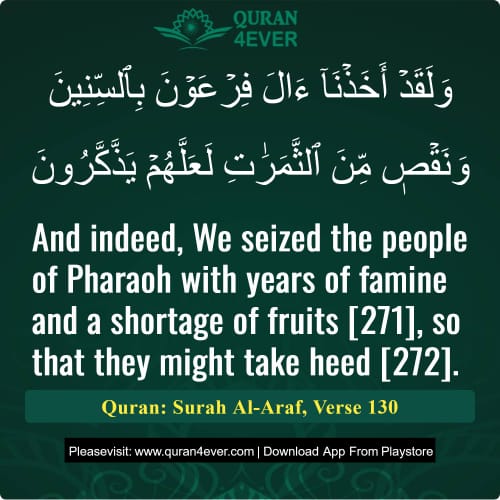
Transliteration:( Wa laqad akhaznaaa Aala Fir'awna bis sineena wa naqsim minas samaraati la'allahum yazzakkaroon )
And indeed, We seized the people of Pharaoh with years of famine and a shortage of fruits (271), so that they might take heed (272).
After enjoying 320 years of uninterrupted luxury, Pharaoh and his people were afflicted with severe drought and famine. Allah subjected them to hunger, a condition Pharaoh had never experienced, in order to humble him and give him a chance to reflect and repent. This teaches that worldly hardships are not random—they are warnings from Allah, meant to stir the heart toward faith and humility.
This famine affected both rural farmlands and urban gardens—their crops, fruits, and vegetation dried up and diminished. Fields no longer yielded grain, and orchards bore no fruit. This widespread loss was a clear sign meant to make them repent and return to the truth. Yet despite these signs, their arrogance blinded them, and they failed to take heed.
130. And indeed We punished the people of Fir`awn with years of drought and lack of fruits (crops), that they might remember (take heed). 131. But whenever good came to them, they said: “This is for us.” And if evil afflicted them, they considered it an omen about Musa and those with him. Be informed! Verily, their omens are with Allah but most of them know not.
Allah said,
(And indeed We punished the people of Fir`awn) We tested and tried them,
(with years of drought) of famine due to little produce,
(and lack of fruits), which is less severe, according to Mujahid. Abu Ishaq narrated that Raja’ bin Haywah said, “The date tree used to produce only one date!”
(That they might remember (take heed). But whenever good came to them) such as a fertile season and provisions,
(they said, “This is for us.”), because we deserve it,
(and if evil afflicted them) drought and famine,
(they considered it an omen Musa and those with him. ) saying that this hardship is because of them and what they have done.
(Verily, their omens are with Allah) `Ali bin Abi Talhah reported that Ibn `Abbas commented on the Ayah,
(Verily, their omens are with Allah) “Allah says that their afflictions are with and from Him,
(but most of them know not.)”
(7:130) We afflicted the people of Pharaoh with hard times and with poor harvest that they may heed.
There is no commentary by Abul Maududi available for this verse.
[397]- Imposed on them by way of trial and warning.

For a faster and smoother experience,
install our mobile app now.
Related Ayat(Verses)/Topics